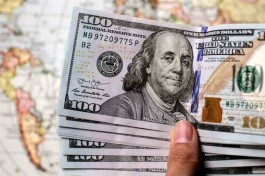There is a growing backlash against the dominance of the US dollar around the world.
Brazil and China recently struck a deal to settle trade in their local currencies in an effort to free themselves from the dollar's dominance in the process, and India and Malaysia in April signed an agreement to ramp up the use of the rupee in cross-border business.
Even France, a longtime ally of the United States, has begun to complete transactions in yuan.
Currency experts fear the emergence and falsehood of their predictions about the fading role of the dollar, as happened during the past century. But as they watched this sudden wave of agreements to marginalize the dollar, they discovered something that had been missing in the past.
Bloomberg news agency reported that the rationale behind many world leaders taking these measures is strikingly similar. They say the US currency has turned into a weapon used to advance US foreign policy priorities and punish opponents.
Nowhere is this clearer than with Russia, where the United States has inflicted unprecedented financial hardship on Vladimir Putin's regime in response to the invasion of Ukraine.
President Joe Biden's administration has imposed sanctions, frozen hundreds of billions of dollars in Moscow's foreign reserves, and removed the country from the global banking system in coordination with Western allies.
For much of the world, it was a stark reminder of their dependence on the dollar, regardless of their opinion of the war.
This is the dilemma facing officials in Washington. By increasingly relying on the green currency in their geopolitical battles, they risk not only undermining the dollar's preeminent position in global markets, but also its ability to enhance their influence globally.
There is no doubt that China plays a big role in the shift away from the dollar, as President Xi Jinping seeks to strengthen the role of the yuan in the global financial system, and this has made his government prioritize expanding the use of the currency abroad.
However, much of this transformation is happening without Beijing's involvement. India - hardly a strategic ally of China - and Malaysia announced in April a new mechanism for conducting bilateral trade in rupees.
This is part of a broader effort by Indian Prime Minister Narendra Modi's administration to avoid using the dollar in at least some international transactions. A month later, the Association of Southeast Asian Nations (ASEAN) agreed to promote the use of member states' currencies in regional trade and investment.
South Korea and Indonesia just weeks ago signed an agreement to promote direct exchanges between the won and the rupee.
Meanwhile, Brazilian President Luiz Inácio Lula da Silva criticized the dollar's dominance during his visit to Shanghai in April.
While standing on a podium surrounded by the flags of Brazil, Russia, India, China and South Africa, an alliance known as “BRICS”, da Silva called on the largest developing economies in the world to find an alternative to the US dollar in foreign trade, asking: “Who decided that the dollar is the commercial currency after the disengagement with gold?”
The Brazilian president was referring to the early 1970s, when the post-World War II Bretton Woods agreement that made the dollar the dominant currency of global finance collapsed.
The collapse of the agreement did not weaken the dollar's strength, and to this day it is the world's dominant reserve currency, which has led to a surge in demand for US bonds and allowed the country to run huge trade and budget deficits.
Bloomberg explained that the centralization of the currency in the global payment system allows America to exert a unique influence on the economic fate of other countries.
About 88% of all global foreign exchange transactions — even those not involving the United States or its corporations — are in dollars, according to the latest data from the Bank for International Settlements.
And since banks that handle cross-border dollar flows maintain accounts with the Federal Reserve, they are vulnerable to US sanctions.
The campaign of financial sanctions against Russia is the most recent and high-profile example of this, but it is not the only one. Both Democratic and Republican administrations have used sanctions against countries such as Libya, Syria, Iran and Venezuela in recent years.
Commenting on the matter, Jonathan Wood, director of global issues at the consulting firm “Control Risks”, said, “Countries have felt anger about the dominance of the US dollar for many decades, and the more aggressive and widespread use of US sanctions in recent years has reinforced this discomfort, and this coincides with Major emerging market demands for a new distribution of global power.
A spokeswoman for the US Treasury noted that the dollar “is used as a global currency for reasons that it is difficult for other countries to find an alternative to it with the same characteristics.”
Market watchers agree. Even as more countries look to reduce their dependence on the dollar, few expect this idea to threaten the US currency's prominent role in global trade and finance anytime soon.






































